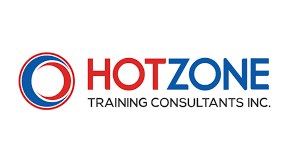Based on the applicable elements from National Fire Protection Association ( NFPA ) 470 Hazardous Materials/Weapons of Mass Destruction (WMD) Standard for Responders, Hot Zone's Hazardous Materials Emergency Response Team (HazMat) Training is specifically tailored to train private sector employer's

HazMat Emergency Response Team Training Summary:
Based on the applicable elements from National Fire Protection Association ( NFPA ) 470 Hazardous Materials/Weapons of Mass Destruction (WMD) Standard for Responders, Hot Zone's Hazardous Materials Emergency Response Team (HazMat) Training is specifically tailored to train private sector employer's Emergency Response Teams to be able to respond to Hazardous Material (HazMat) release emergencies within your organization.
Examples can include leaking or punctured small containers, drums, and totes, or damaged larger means of containment like tanks, vessels, and rail tankers holding large volumes of chemicals including corrosives (ammonia, sulfuric acid, hydrochloric acid, chlorine), flammables (toluene, ethanol, ethylene oxide, gasoline), poisons (cyanides, hydrogen sulfide, vinyl chloride, mercury). Note, many chemicals, even those listed here can have multiple hazardous properties.
We prepare Emergency Response Teams with the knowledge and practical skills needed to approach HazMat emergencies with competence and confidence. Your team will be trained to safely mitigate unplanned spills and releases, in order to help protect your employees, reduce the extent of environmental impact, and support your organization's business continuity.
Course Outline and Topics:
Rules and regulations around hazardous materials response
Chemical properties and identification
Incident command and scene control at a hazardous materials incident
Hazard assessment
Personal Protective Equipment (PPE) selection
Respiratory protection
Donning, doffing, use, and maintenance of PPE. This includes Self-Contained Breathing Apparatus Training. (Note: Quantitative Fit Testing is separate)
How to perform air monitoring
Decontamination practices
Spill and leak control and mitigation
Multiple practical mock chemical release and response scenarios
Incident debriefing
Knowledge exam
About Hot Zone Training
An expert in the field of Health and Safety training and consultation, Hot Zone’s dedicated team of professionals works with our clients to deliver best-in-class service to satisfy an array of Health and Safety needs and requirements.
With nearly 25 years of experience providing our knowledge and hands-on expertise to various industries and organizations, we’ve been able to grow our reputation and business, administering our training, skilled advice and assistance to clients all over North America.
An authority in the development and provision of Health and Safety courses and education, we offer a range of services, from Confined Space Entry and Rescue and Fall Arrest training to certifications for a variety of Material Handling and Emergency Response specialties including Hazardous Materials Training. Leaders in Respirator Fit Testing, we also ensure that tens of thousands of frontline healthcare workers can continue to do their critical work safely and comfortably during difficult public health emergencies. And, with consulting services that include risk assessments and assistance in the development of business continuity plans, we’re able to offer our clients a full spectrum of Health and Safety services.
Driven by our continued commitment to supporting the Health and Safety of all our clients, and bolstered by our personal and professional approach to training and consultation, Hot Zone is proud to be Canada’s foremost provider of solutions to meet all of your current and evolving Health and Safety needs.
© 2025 coursetakers.com All Rights Reserved. Terms and Conditions of use | Privacy Policy